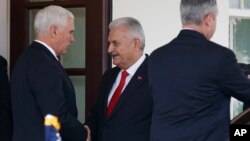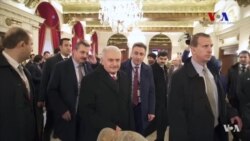U.S. Vice President Mike Pence on Thursday expressed "deep concern" to Turkish Prime Minister Binali Yildirim about the arrest of U.S. citizens and Turkish staff members at U.S. consulates in Turkey.
But Pence and Yildirim also expressed hope that their meeting would help usher in a new chapter in U.S.-Turkey relations and agreed on the need for constructive dialogue, as friends and allies, on bilateral challenges.
The Turkish prime minister arrived in Washington on Nov. 7 for a meeting with Pence. But that was postponed when Pence traveled to Texas Wednesday to honor those killed in the Sutherland Springs church massacre.
The delay gave Yildirim time to take in the local sights, and he was seen walking along the National Mall and visiting several prominent monuments and memorials with his entourage.
WATCH: Vice President Pence: 'Deep Concern' About Americans Held in Turkey
The meeting with Pence took place at the White House Thursday.
State Department spokesperson Heather Nauert shared the highlights:
The vice president thanked the “prime minister for Turkey's contribution to global security and the fight to defeat ISIS. And he underscored the U.S. commitment to stand with Turkey against PKK and other terrorist threats. The vice president expressed deep concern over the arrest of American citizens, our mission Turkey local staff, who worked for our embassy there or who still do work … and urged transparency and due process in the resolution of their cases."
Nauert told VOA that Pence brought up the fate of American pastor Andrew Brunson, who was jailed in Turkey a year ago on accusations of supporting U.S.-based Turkish cleric Fetullah Gulen. Nauert said Pence has a passion for promoting human rights and religious freedom.
Before leaving Ankara, Yildirim said he wanted to discuss the extradition of Gulen and the fate of Reza Zerrab, a Turkish-Iranian gold trader arrested in the U.S. in March 2016 on charges of violating sanctions on Iran.
"We want the concerns we have regarding the cases of our citizens arrested in the United States to be eased. They (U.S. officials) also have similar requests, and diplomatic channels are being used for discussions, we are both seeking a way out," Yildirim said.
President Donald Trump and Turkish President Recep Tayyip Erdogan have made it clear they want to downplay differences and boost U.S.-Turkish relations.
But that will be difficult, analyst Gonul Tol of the Middle East Institute told VOA, given the concern over Erdogan's respect for the rule of law.
"And even if that is the case, even if personally Erdogan and Trump would like to resolve problems, I think because of the wider perception of Turkey here in Washington, it is very difficult for Trump to take steps and avoid that general consensus in Washington, D.C."
This week, the State Department announced the resumption of limited visa services in Turkey, signaling a sign of some improvement in U.S.-Turkish relations, after both countries had stopped issuing visas to each other's citizens over the arrests of U.S. diplomatic personnel.






